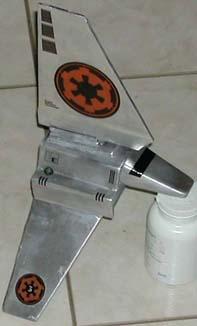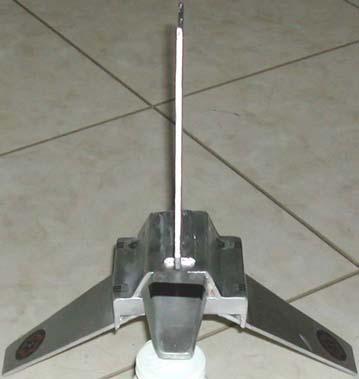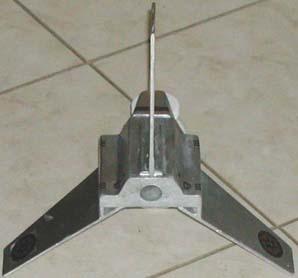Essence Aerospace Technologies 18mm Lambda-Class Shuttle
Essence Aerospace Technologies - 18mm Lambda-Class Shuttle {Kit}
Contributed by Dick Stafford
| Construction Rating: | starstarstarstarstar_border |
| Flight Rating: | starstarstarstar_borderstar_border |
| Overall Rating: | starstarstarstarstar_border |
| Manufacturer: | Essence Aerospace Technologies |
Brief:
This 18mm version of the Lambda-Class Shuttle was produced in limited
quantities by EAT (Essence Aerospace Technologies). Although the kit isn't
being produced, you can still purchase a plan pak
[here]. It
is one of the most innovative kits around and is a great addition to anyone's
fleet.
Construction:
Parts:
- One 1/4" balsa sheet (3" x 6")
- Two 1/8" balsa sheet (6" x 7" each)
- One 3/32" balsa sheet (3" x 1")
- 3" 18mm motor tube
- 18mm thrust ring
- 18mm thin plastic, 2 piece nose cone
- 1/8" launch lug
- 24" Kevlar® shock cord
- 18" plastic parachute
- BB's
- Decal set
Tools/materials:
- Pencil
- Metric ruler (T-Square is recommended, but I didn't use one)
- X-acto-type knife with a new blade (I did follow this advice)
- Estes 18mm motor (spent or not)
- Wood glue - TiteBond Original is recommended
- 5-minute epoxy
- CA
- Masking tape
- Sand paper (220 grit) on a block
- Sand paper (220 grit) on a dowel
- Sand paper (400 grit) on and off a block
- Wood filler (Elmer's Fill-n-Finish, etc) or paper for lamination
This is not your typical kit with 3 - 4 fins to cut. The Lambda-Class Shuttle has 13 unique balsa parts and 19 total. The instructions were highly detailed with plenty of color photos. The kit includes a page of templates and a couple of alignment guides. The parts were all of nice quality, except I thought the nose cone was flimsy. I'm sure other cones could be substituted.
Your first build the base assembly, which consists of three balsa pieces, the motor tube and motor block. This was straightforward and went together easily with wood glue. The Kevlar® shock cord is attached to the joint between the core and the motor tube with 5-minute epoxy.
You then cut out the large top fin and strengthen it. More on this later. The fin is attached to the top of the motor tube using the fin alignment guide. I used black rubberized CA in place of wood glue.
 The canopy is constructed over the base and
around the top fin. This consists of four balsa sections. The top and sides go
on first and the rear plate later. I miss-measured ever so slightly and had to
adjust the rear plate slightly. Luckily, I test fit the template before I cut
balsa. At this point, I also I added the lower wing supports and let it all sit
overnight.
The canopy is constructed over the base and
around the top fin. This consists of four balsa sections. The top and sides go
on first and the rear plate later. I miss-measured ever so slightly and had to
adjust the rear plate slightly. Luckily, I test fit the template before I cut
balsa. At this point, I also I added the lower wing supports and let it all sit
overnight.
I strengthened the lower wings the same way as the top (again, more later). While this was drying, I filled and sanded the body.
For the nose cone, you start by gluing the shoulder into the cone with CA. I used black rubberized CA and accelerant to assemble the entire nose. After it is dry, you cut the top away at an angle that sets the downward slant of the upper nose cone plate. The shell of the cone consists of six balsa sections. You start by aligning the top plate with the body while it is laying on the surface of the cone that you just cut, and gluing it in place. With the plate flush with the body, I simply twisted the cone until it had the best fit. You then add the bottom and the sides. The side pieces have to be beveled and took some effort to assemble. I also found that the sides were a bit long, probably due to some problem with the angle of the nose cone (?). This was easily compensated for. The final step is filling the nose with BB's and epoxy. I ran out of five minute so I used 20 minute epoxy. I also threw in some #7 ½ lead shot to boost the weight, just in case I built the body too heavy. Building light is a consistent warning with this kit. Oh, and I almost forgot to set the shock cord in the BB/epoxy mix. This would have been a major problem. After the epoxy had cured, I sanded the edges and did some filling with fill-n-finish. The nose cone did live up to the reputation as being the most difficult part of the kit. Nevertheless, the cone looks fine and fits perfectly in spite of the few minor issues encountered.
I have to rate the construction of the kit a 4. I had a few minor difficulties, but you have to realize the kit is advertised as being skill-level 5. Luckily, these were all easily correctable.
Now for the saga of how I strengthened the fins. Note that this was my problem and is not a mark against the kit. I'm merely telling this in case anyone else is so foolish. I elected to laminate it with drafting vellum and 3-M spray adhesive. This was the first time I tried this, so it was itself an experiment. I sprayed two entire sheets with the adhesive, sandwiched the fin, and pressed it flat while the glue dried. I then trimmed the paper, applied thin CA to the edges, and sanded them flat. This seemed to work well, so I used the same method on the lower fins. After a day, there were a few bubbles, but nothing that couldn't be fixed. But, disaster struck when I primed the model. The solvent in the primer attacked the glue and after it dried about 50% of the paper was lifted from the balsa. I ended up pulling all the paper off. The remaining surface is gummy and a mess. Since I added a little extra nose weight, I added 1/64" birch ply over both sides of the lower section of the top fin. It only extends from the small tab where the fin attaches up to where the leading edge starts backwards. Still, this is not a recommended strengthening method.
 Finishing:
Finishing:
In the final version, all balsa surfaces were filled with fill-n-finish. I gave
it a couple of coats of white primer and then painted it with Wal-Mart brand
chrome paint. It was supposed to be Plasti-Kote Car Color Ford Motors 8147 -
Platinum, but I couldn't resist the cheaper paint. The kit included some
decals, including one with the kit's serial number - mine is S/N #3. I also
managed to wrangle an extended set of decals that weren't in the kit. Thanks,
Nick! Theses decals were some of the easiest to work with, possibly because
they came pre-coated.
For a kit of this size, there is a lot of balsa surface to seal/finish - actually the entire surface is balsa. I guess I give it a finishing rating of 4, which keeps the overall construction rating a 4.
Construction Rating: 4 out of 5
Flight:
I carefully packed the chute and stuffed it into the cavity next to the motor
tube. I repacked it a couple of times and it still seemed too tight to me. And
it was. I flew the Shuttle twice on a C6-3 and a B6-2. Both flights were
straight and it appeared to try to fly parallel to the ground after burn out.
This rocket was in general a crowd-pleaser and really caught the attention of
the visiting scout troop! On the first flight with the C6-3 the chute didn't
budge, but it landed without damage. On the second flight, the chute
almost deployed. This time the top fin snapped off. It is easily
repairable and will fly again. Due to the chute issues, I have to give it a
flight rating of 3.5, including an extra point for the cool factor.
Flight Rating: 3 out of 5
Summary:
This was a challenging, unique kit and was fun to build and fly. The
instructions were great and quality of the parts were good, with the exception
of maybe the nose cone. There were a few places that I ended up having parts
that didn't fit. This was probably my fault and was easily corrected. The chute
packing issue is the biggest con with this kit. Going up it flies great, coming
down was another story.
Jase, how about a drag race at the next TRF Meet?
Overall Rating: 4 out of 5
Other Reviews
- Essence Aerospace Technologies 18mm Lambda-Class Shuttle By Dick Stafford
(by Jason Myers - 01/14/03) Brief: This kit is the Star Wars Lambda Class Shuttle. Most people will probably remember that it is the vessel that the Rebel Alliance used to smuggle themselves onto the moon of Endor to destroy the shield generator that protected the second Death Star in Return of the Jedi. Is it an 18mm downscale of a scratch built design by EMRR. It is single stage and ...
Sponsored Ads
 |
 |











